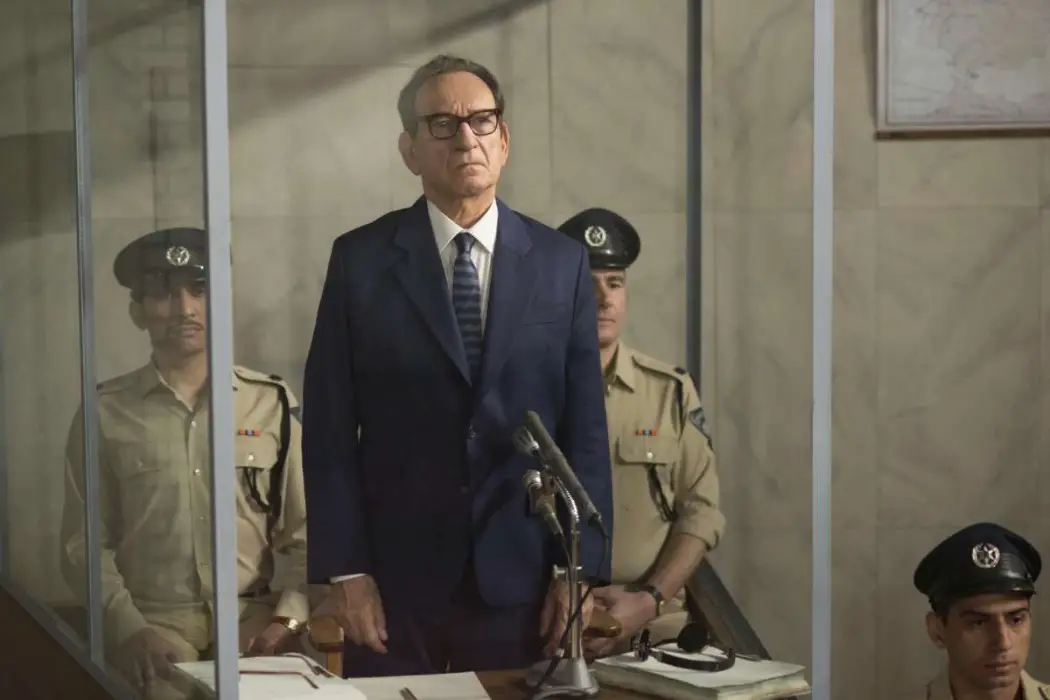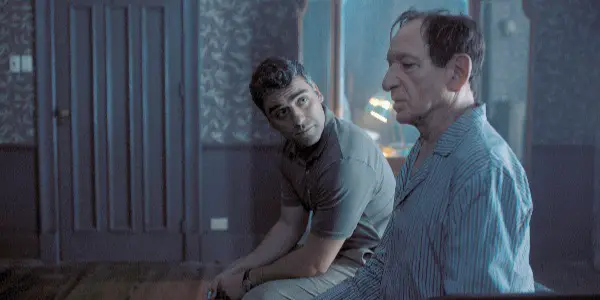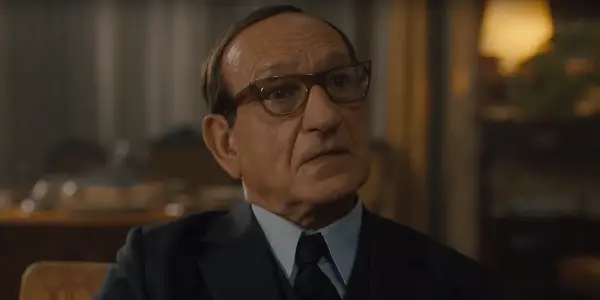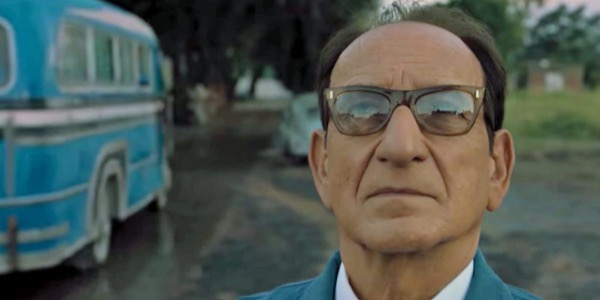“I Never Got Into His Mind, Ever.” Interview With Sir Ben Kingsley, On Playing A Nazi War Criminal In OPERATION FINALE

Stephanie Archer is 39 year old film fanatic living in…
There are those actors that stand in an elite class all their own. Their unique ability to mold themselves into an unlimited capacity makes them at once believable and adored. Chameleons by trade, they do not always require labor intensive makeup and prosthetics, but can find the same success in an deep understanding of character, nuance and the subtlety of change that defines all of us. When speaking of such ability, Sir Ben Kingsley leads the class.
Best known for his starring and award winning role as Ghandi, Sir Ben Kingsley has proven himself the ultimate chameleon, immersing himself in a wide range of roles. He has been everyone and everywhere, no limitation of ethnicity, gender, historical accuracy or age. Yet, throughout his acting choices, Sir Ben Kingsley has returned time and time again to the horrors that befell the Jews during the Holocaust, becoming a recognizable face in the efforts to educate, memorialize and denounce the actions of World War II and the Nazi Regime. Previously having played a Nazi hunter, a Schindler survivor and an ill-fated hideaway, Sir Ben Kingsley has changed from prey to predator, adding an infamous Nazi lieutenant to his repertoire.
I had a chance to speak with Sir Ben Kingsley about Operation Finale and his take on the high ranking Nazi Lieutenant Adolf Eichmann – the man behind the crafting of The Final Solution.
Stephanie Archer for Film Inquiry: How are you, Sir Kingsley?
Sir Ben Kingsley: I’m very well, thank you. Nice of you to ask. I’m very well. We’re having a really great day here. Lots of curiosity and people totally intrigued by the film. It’s been a very good level of debate.
Yes. I saw it last night and it was very impressed with Operation Finale. I’ve actually never seen a World War II film that potentially draws out empathy for a historical villain, nor actually ends in such a hopeful manner. My first question is Adolf Eichmann has been quoted to have said he would “leap laughing into the grave because the feeling you had of 5 million people on his conscience would be for him a source of extraordinary satisfaction”. How did you get into the mind of such a dark and ruthless mass murderer?
Sir Ben Kingsley: I never got into his mind, ever. My perspective, my point of view, on that portrait of Eichmann was entirely shaped by my close association, friendship, with the survivors of the Holocaust that I have been privileged to meet in my journey as an actor, starting with Simon Wiesenthal whom I portrayed in a mini-series Murders Among Us – the five members responsible for locating Eichmann in Buenos Aires.

Then, I went onto portray Itzhak Stern in Steven Spielberg‘s wonderful Schindler’s List, and of course back then, we met many of the Schindler survivors, particularly Poldek and Mila Pfefferberg. Then of course I moved on to play Otto Frank in Anne Frank: The Whole Story, where I meet Miep Gies, who sheltered the Frank family in the attic. I met Jacqueline van Maarsen, who was Anne Frank’s school friend. Then throughout all this acquaintance and working with these extraordinary feats of the Holocaust, I became acquainted and became very fond of Elie Wiesel. Again, I had some wonderful experiences.
I based my performance on the suffering that he caused to some of my closest and dearest friends amongst the survivors, particularly inspired by Elie Wiesel, to whom I dedicate my performance.
So I was very well equipped, Stephanie, to allow my perspective on Eichmann to be that of the victim. I never had to get into his mind, his silhouette, his shape. It was molded by my knowledge of his victims and how much they had suffered under him. So if you like, accept this as a fact. I did not base my performance on his ideology, I based my performance on the suffering that he caused to some of my closest and dearest friends amongst the survivors, particularly inspired by Elie Wiesel, to whom I dedicate my performance.
I’ve heard that you kept a distance from your co-stars to maintain a polarization as…
Sir Ben Kingsley: I always do. I’m actually quite well known for being a hermit on a film set. I never ever really mix with other cast members. I love to hold back that interaction until we get to the real deal of interaction, which is when we do our job in front of the camera. And this was a very, you know, very easily accepted and the norm for me and I felt that it heightened the excitement of encountering each other on the set rather than encountering each other, perhaps slightly anticipating the mandate of the film socially. So, I think it served the film very well. All of us go to serve the film. We’re not there to have a good time, we’re there to work.
And you had mentioned that you had previously starred as Isaac Stern in Schindler’s List, as well as other roles. What was it like switching sides to bring to life a high ranking Nazi officials, specifically the man that crafted the final solution?
Sir Ben Kingsley: Yes, of course. I was motivated by and inspired by my acquaintanceship and friendship with the few precious survivors that I had met, and my urgency and insistence to tell their story. I can tell their story by creating a portrait of Adolf Eichmann, I can tell their story by wearing a yellow star on my coat in a movie. There are many ways of telling a story and my portrait of Eichmann is and was molded by the overwhelming grief of the victims and by those that I’ve met – their extraordinary dignity. So, my emotions were very pure and I never got into Eichmann’s head and he never got near me. I kept my distance from him and I think that distance helped me to portray him.

Your performance as Eichmann I found rather unexpected, as I think other viewers will. I found myself fighting an urge of empathy towards the character as he tried to give his own “side of the story”. So there seems to be a contradiction presented in a perceived truth. How did you manage to find or portray this balance?
Sir Ben Kingsley: I think what we must accept, however painful, is that Adolf Eichmann was a human being. A monster is something we place outside of humanity, the very nature of the word dictates that we place him outside of us. I’m very sorry to say, that history will show that these men and women who were Nazis were human beings. They had families, they had pets, they ate meals, they drank beer, they slept well at night.
It’s very, very hard to take this, but if I portrayed Eichmann as a B-movie villain or a comic strip villain or a two-dimensional baddy, I would be doing a terrible disservice to history, and to its victims. His victims were manipulated very, very skillfully by a man who lived amongst men. So, therefore, I portrayed a living, breathing human being. To do otherwise would be to do a great disservice to his victims and to history.
I portrayed a living, breathing human being. To do otherwise would be to do a great disservice to his victims and to history.
And you can see that in the decision to show Eichmann with his family in a regular situation, which is very striking because he appears to be no different to anyone else around us. I was also surprised to hear the use of a British accent throughout the film. Why was the decision made not to modify to make it a German or Austrian?
Sir Ben Kingsley: None of us employed any accent. The Israeli’s didn’t have accents. None of it. It was a device we agreed with our director, Chris [Weitz]. When you have an opportunity to talk to our director, maybe you should pursue this question. But it was agreed amongst the cast that to hide behind an accent would be to slightly present a bit of a clunky old World War II villain with a funny accent. We walked to accentuate the fact that this was a man amongst men, and therefore you have to remove any of the extraneous masks. I thought it was a wonderful decision on the part of the director. Nobody has anything other than their own voice.
That makes amazing sense and I love that answer. Recently you were at the Tribeca Film Festival with Steven Spielberg and Liam Neeson commemorating the 25th anniversary of Schindler’s List. And you and the cast discussed the mentality of the citizens in Poland while filming. While filming this movie, Operation Finale, what was it like filming in Argentina, a country said to be embarrassed for harboring Nazi war criminals?
Sir Ben Kingsley: I think it was quite focusing for us to be so close. I think it was a very good choice, a very good choice to film it where it happened because that kind of subliminal information enhances our performance and sharpens the accuracy of the film. Again, another very good choice to film it there.

The invention of television was an important aspect of showing the depth of horror and treatment of the Jews during World War II, as well as the justice they obtained through the Eichmann trial. With a growing animosity towards social media today, what are your thoughts in regards to its ability to showcase present horrors of the world we might not have previously had the ability to see in such an instantaneous manner?
Sir Ben Kingsley: So, at the end, in the closing moments of the film, you do see Holocaust survivors who are grief stricken, that are able to articulate their accusation and are literally able to point to their torturer and accuse him and verify the fact that it was him. This is very, very important. The fact that they are, that we acknowledge that it happened is as important as punishment.
Simon Wiesenthal always used to say, “I don’t necessarily want revenge. I just want them to say that they did it”. And I think that that opportunity, one of the first opportunities, to broadcast the voice of the victims worldwide was a wonderful decision and a great breakthrough for Israel. I think the trial was conducted with extraordinary respect and dignity. So, I think that the closing moments of our film are very, very important.
I really loved that part because it was very resounding all throughout history, especially with technology being introduced at various points. With the footage of the trial, were you able to watch any of it to prepare for this role, for any nuances or just preparation in general?
Sir Ben Kingsley: I did. I did watch some of the trial, yes. It is a portrait and I did have an opportunity to see, you know, the man I was to portray. I was creating a portrait of somebody rather like a painter, so anything that could enhance my observation of him was of use. But that’s external, as I said before, the internal workings of my performance were entirely dictated by and dedicated to the memory of the victims.
Film Inquiry would like to thank Sir Ben Kingsley for taking the time to speak with us.
Operation Finale is released in the US on August 29, 2018 and the UK on September 14, 2018. For all international release dates, see here.
Does content like this matter to you?
Become a Member and support film journalism. Unlock access to all of Film Inquiry`s great articles. Join a community of like-minded readers who are passionate about cinema - get access to our private members Network, give back to independent filmmakers, and more.













